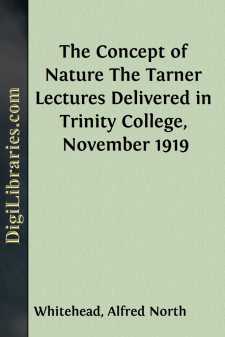Nature
- Animals 47
- Birds & Birdwatching 41
- Dinosaurs & Prehistoric Creatures 1
- Flowers 5
- General
- Horses 6
- Insects & Spiders 19
- Mammals 7
- Mushrooms 2
- Natural Disasters 6
- Natural Resources 3
- Reptiles & Amphibians 2
- Trees & Forests 10
General Books
Sort by:
PREFACE The contents of this book were originally delivered at Trinity College in the autumn of 1919 as the inaugural course of Tarner lectures. The Tarner lectureship is an occasional office founded by the liberality of Mr Edward Tarner. The duty of each of the successive holders of the post will be to deliver a course on ‘the Philosophy of the Sciences and the Relations or Want of Relations between...
more...
by:
John Burroughs
WAYS OF NATURE I was much amused lately by a half-dozen or more letters that came to me from some Californian schoolchildren, who wrote to ask if I would please tell them whether or not birds have sense. One little girl said: "I would be pleased if you would write and tell me if birds have sense. I wanted to see if I couldn't be the first one to know." I felt obliged to reply to the...
more...
by:
John Burroughs
JOHN BURROUGHS John Burroughs was born April 3, 1837, in a little farmhouse among the Catskill Mountains. He was, like most other country boys, acquainted with all the hard work of farm life and enjoyed all the pleasures of the woods and streams. His family was poor, and he was forced at an early date to earn his own living, which he did by teaching school. At the age of twenty-five he chanced to read...
more...
PREFACE The value of Knowledge and Character is duly impressed upon us. Of the value of Freedom we are told so much that we have come to regard it as an end in itself instead of only a means, or necessary condition. But Beauty we are half-inclined to connect with the effeminate. Poetry, Music, and Literature are under suspicion with the average English schoolboy, whose love of manliness he will share...
more...
olitude! Where under trees and sky shall you find it? The more solitary the recluse and the more confirmed and grounded his seclusion, the wider and more familiar becomes the circle of his social environment, until at length, like a very dryad of old, the birds build and sing in his branches and the "wee wild beasties" nest in his pockets. If he fails to be aware of the fact, more's the...
more...
INTRODUCTION. There is no island in the world, Great Britain itself not excepted, that has attracted the attention of authors in so many distant ages and so many different countries as Ceylon. There is no nation in ancient or modern times possessed of a language and a literature, the writers of which have not at some time made it their theme. Its aspect, its religion, its antiquities, and productions,...
more...
IV. APRIL—BUDS AND BIRD SONGS “Has she not shown us all? From the clear space of ether, to the small Breath of new buds unfolding? From the meaning Of Jove’s large eyebrow, to the tender greening Of April meadows?”“And whiles Zeus gives the sunshine, whiles the rain.”A strong southeast wind is blowing straight up the broad river, driving big undulations up the stream, counter to the current...
more...
by:
George Grey
CHAPTER 1. COMMENCEMENT OF THE EXPEDITION. TENERIFE. GENERAL PLAN AND OBJECTS. The Expeditions of which the results are narrated in the following pages took their origin from a proposition made to Government by myself, in conjunction with Lieutenant Lushington,* in the latter part of the year 1836.(*Footnote. Now Captain Lushington of the 9th Foot.)At that time a large portion of the western coast and...
more...
VII.—AN OLD ROAD IN JULY In the old woods road a soft haze hung, too subtle to see save where its delicate colorings were contrasted against the dark green leaves of the oaks beyond the fence. Not the tangible, vapory haze of early morning, but a tinted, ethereal haze, the visible effluence of the summer, the nimbus of its power and glory. From tall cord grasses arching over the side of the road,...
more...
by:
John Lubbock
INTRODUCTION The world we live in is a fairyland of exquisite beauty, our very existence is a miracle in itself, and yet few of us enjoy as we might, and none as yet appreciate fully, the beauties and wonders which surround us. The greatest traveller cannot hope even in a long life to visit more than a very small part of our earth, and even of that which is under our very eyes how little we see! What...
more...











